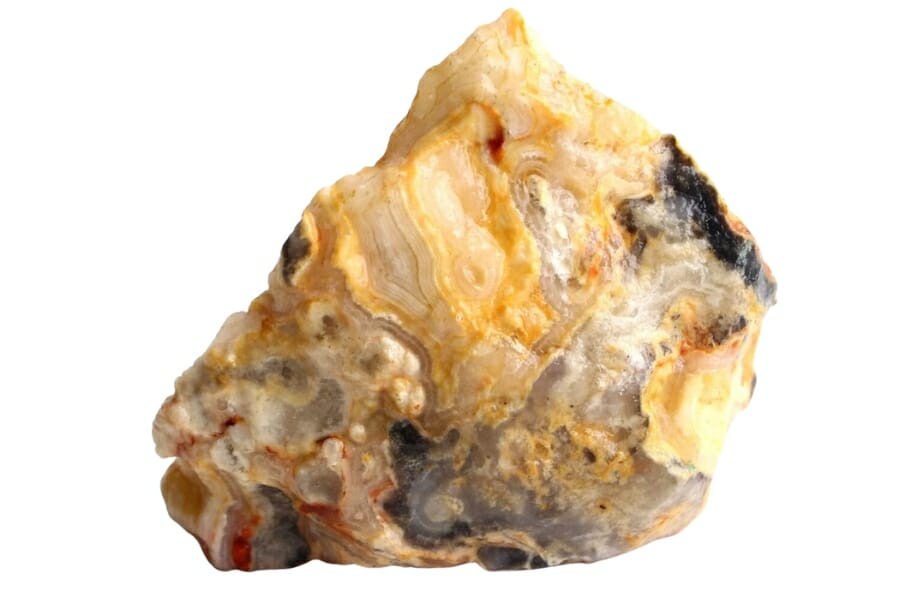In Georgia, agates can be found in many different places, but they are not always easy to find. When there aren’t any visible signs or specific geological formations, it can be challenging for agate hunters to find good places to look.
Lucky for you agate hunters in Georgia, there are a lot of resources to help you be successful. With the right advice and perseverance, you can find a lot of beautiful specimens and enjoy the thrill of seeing these unique gemstones in the different landscapes of Georgia!
What is Georgia Agate?
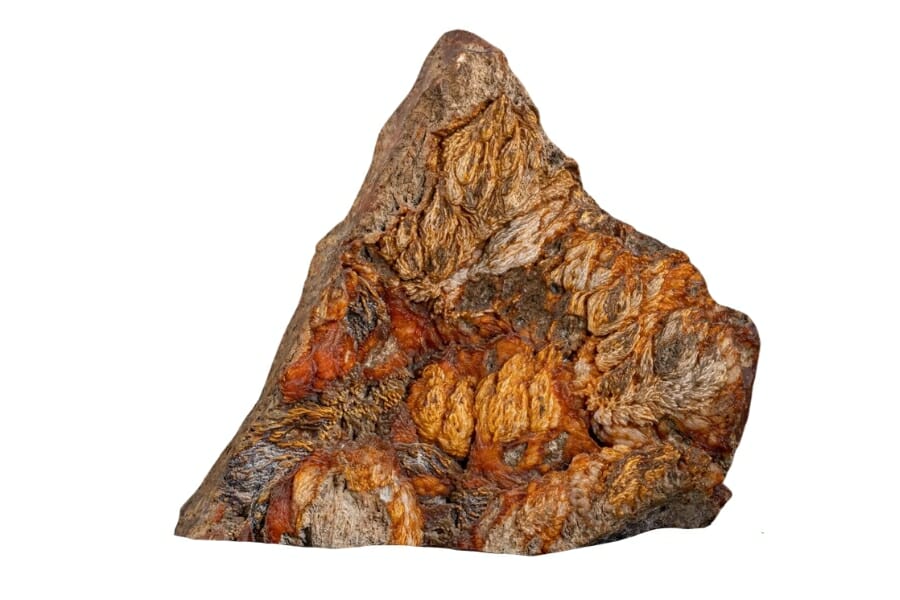
Agate specimens are valued for their bright colors, intricate patterns, and unique banding. Each piece of agate, from the clear and milky white ones to the bright blue, green, and red ones, is a work of art made by nature.
They also have exciting structures inside, like bands, swirls, or even pieces of other minerals, which add to their beauty.
It’s made by a process called “secondary deposition,” in which silica-rich fluids flow into the cracks and holes in rocks and harden into agate. This process takes a long time, sometimes millions of years, and it happens when water with dissolved silica gets into volcanic or sedimentary rocks.
Find out what the price of agates is with the help of our article.
Moss agates
Moss agate is a type of agate that has inclusions that look like moss, giving it a unique and exciting look. The name comes from the inclusions looking like branches or moss.
These spots are mostly green, brown, or black, but they can also be red, yellow, or white. Moss agates are made when mineral-rich fluids with iron or manganese oxide mix with the silica solution that makes agate.
As fluids move through the agate, they form structures resembling moss or other plant patterns. The result is a beautiful gemstone with a mesmerizing mix of clear quartz and complex formations that look like moss.
Moss agates can be found in many places worldwide, but it is unlikely that there are large amounts of them in Georgia.
Fire agates
Fire agate is a beautiful agate known for its fiery, iridescent colors and the mesmerizing way light moves through it. It stands out because of its bright colors, like red, orange, yellow, and brown.
These colors often look like the flames of a fire. The agate’s unique iridescence comes from thin silica and iron oxide layers that have built up on its surface. When light hits the stone, these layers cause interference and diffraction patterns, which show off a beautiful range of colors.
They’re made in hot, silica-rich volcanic environments where water with iron and other minerals dissolved in it seeps into cracks or holes in the rock. Over time, the fluids rich in silica crystallize, making layers of agate that look like they are on fire.
Georgia has different kinds of agate deposits, such as banded agates, moss agates, and others. However, fire agates don’t usually form in the state because the right conditions aren’t there.
Blue lace agates
Blue lace agate is a beautiful type of light blue agate with intricate patterns that look like lace. It’s a type of chalcedony, which is a microcrystalline quartz. Trace amounts of minerals like copper or aluminum give it its unique blue color.
It has patterns resembling swirling, ethereal laces or delicate frost patterns. The stone is often see-through, which lets light pass through it and makes it look even more beautiful. Blue lace agate is often used in jewelry and as a decorative stone because it’s thought to have calming and soothing effects.
Blue lace agate is not commonly found in Georgia.
The key factors in our recommendations are:
- The deep experience and understanding of our team about the area
- Recommendations from local groups and clubs
- How easy it is to get the a particular location
- Safety and potential hazards when collecting
- Weighing private and public locations
- The ability for both experienced and novice agate enthusiasts to find great samples
With these factors in mind we’ve been able to put together a fantastic list that just about anyone can use!
DON'T MISS OUT ON ANY GREAT FINDS!
While you're out searching for Agates you're going to find A LOT of other interesting rocks and minerals along the way. The last thing you want to do is toss out something really interesting or valuable. It can be easy to misidentify things without a little guidance.
We've put together a fantastic field guide that makes identifying 140 of the most interesting and valuable rocks and minerals you will find REALLY EASY. It's simple to use, really durable, and will allow you to identify just about any rock and mineral you come across. Make sure you bring it along on your hunt!
The Best Spots To Find Agates in Georgia
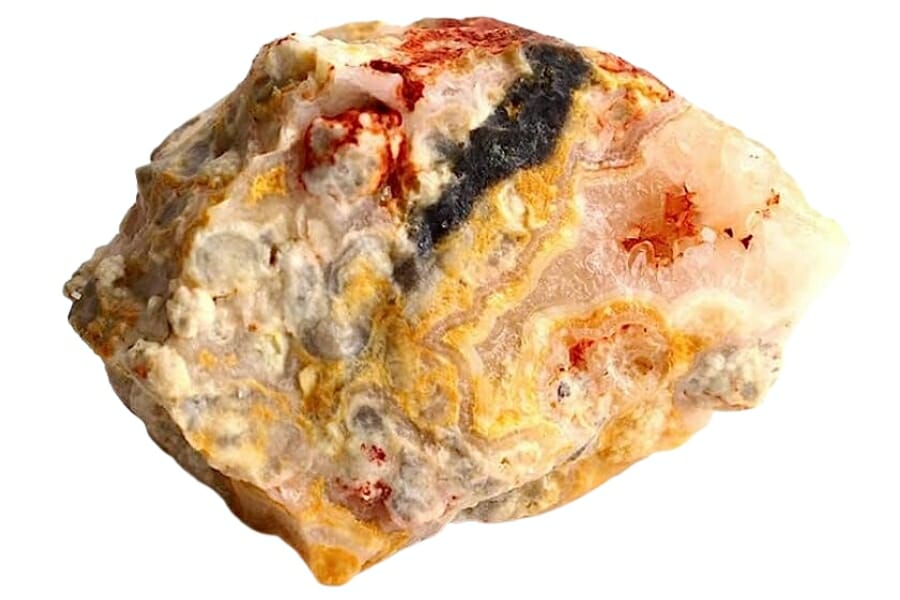
Here are our suggested places in the state where you can find agates. Even though there are many excellent places to find gems in Georgia, not all are suitable and can contain agates.
Always Confirm Access and Collection Rules!
Before heading out to any of the locations on our list you need to confirm access requirements and collection rules for both public and private locations directly with the location. We haven’t personally verified every location and the access requirements and collection rules often change without notice.
Many of the locations we mention will not allow collecting but are still great places for those who love to find beautiful rocks and minerals in the wild without keeping them. We also can’t guarantee you will find anything in these locations since they are constantly changing.
Always get updated information directly from the source ahead of time to ensure responsible rockhounding. If you want even more current options it’s always a good idea to contact local rock and mineral clubs and groups
Chattahoochee River
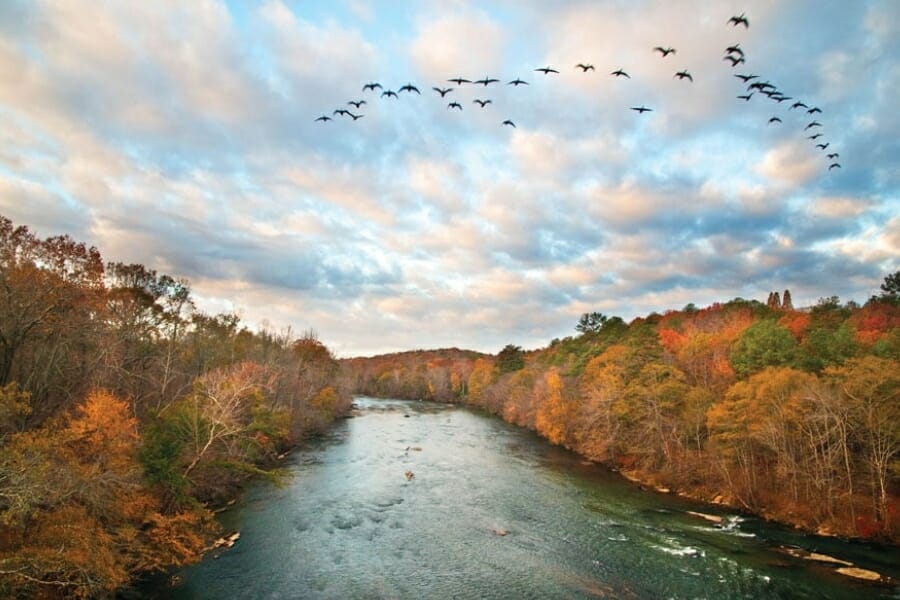
The Chattahoochee River runs for about 430 miles through various landscapes, such as mountains, rolling hills, and forests. This makes it an excellent place for agates to form and be left behind.
Because the river’s geology is so different and has been around for a long time, agates have had many chances to be carried by the river and left along its path. Agates in the Chattahoochee River can have different colors, patterns, and sizes, making each find unique and exciting.
Before bringing your agate crystals home from Georgia, know the most recent rules about collecting there.
Where we found agates in the Chattahoochee River
People like to go to the part of the river near Helen, Georgia, because it has beautiful scenery and gravel bars with agates. The area around Morgan Falls Dam in Sandy Springs has also been suggested to look for agates.
Etowah River
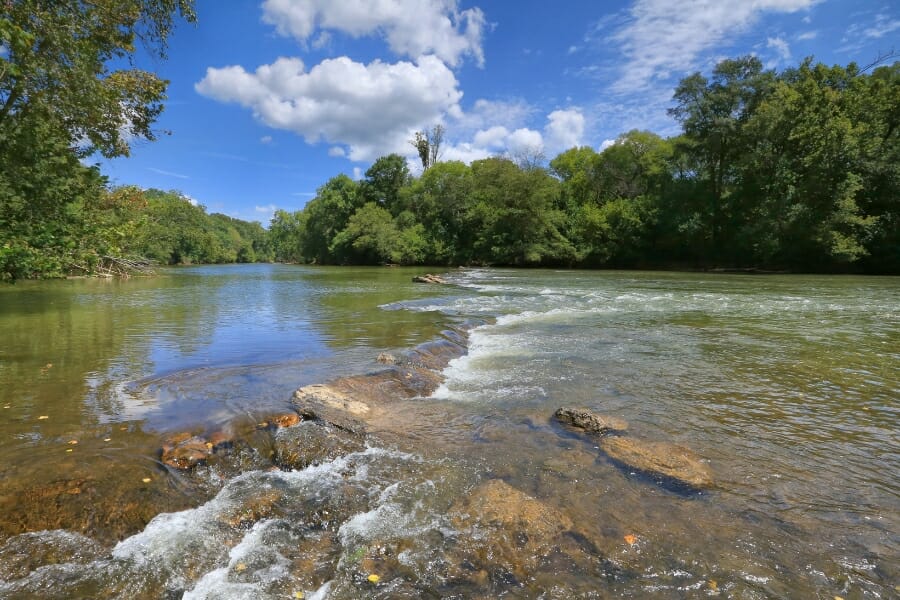
The Etowah River flows through various rock types, including igneous, metamorphic, and sedimentary rocks. These kinds of stones could be places where agates form.
The constant flow of the river and the movement of sediments help expose and move agates over time. This makes the Etowah River a great place to go agate hunting.
The river is about 164 miles long and flows through beautiful places like rocky outcrops, forests, and rolling hills. These different kinds of land allow agates to form and be left behind.
Where we found agates in the Etowah River
Most of the time, you can find agates in riverbeds, gravel bars, and other places where erosion has exposed them. These locations are more likely to contain agate nodules or loose agate pebbles.
Savannah River
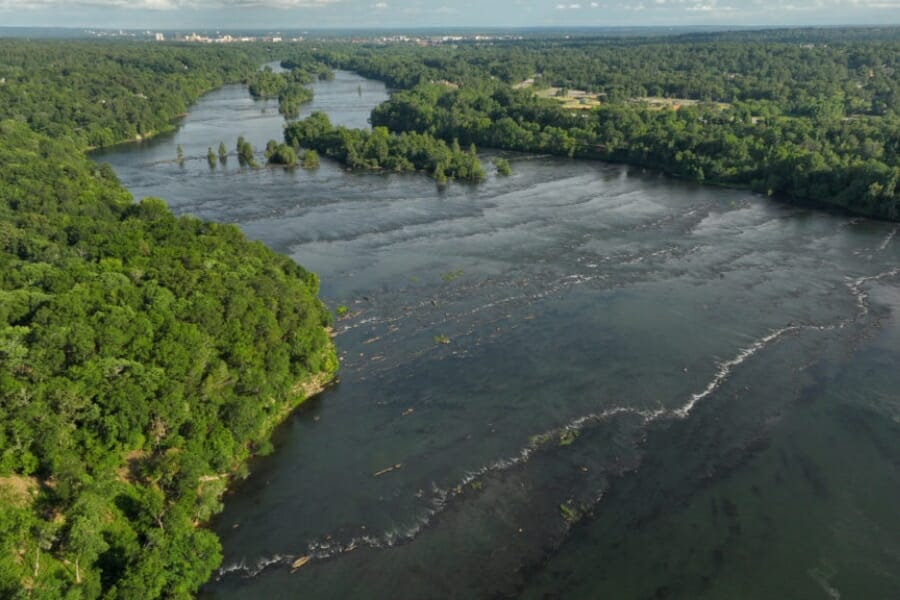
The river flows through different kinds of land, such as rocky banks, sandbars, and open riverbeds. Because of these changing conditions, agates can form and be found in the Savannah River, making it an excellent place for people looking for them.
Agates are often found where a river has eroded its banks or where sediments have been deposited, such as gravel bars and sandbars. In these places, you might discover agate nodules or loose agate pebbles that the river’s flow has carried and exposed over time.
While taking in the beauty of the Savannah River, agate hunters can enjoy the adventure of looking for these beautiful stones in Georgia’s waterways.
Where we found agates in the Savannah River
You can find exciting specimens when you explore parts of the Savannah River that have agates. Some places, like the part of the river near Augusta, Georgia, are good places to look for agates.
Soque River
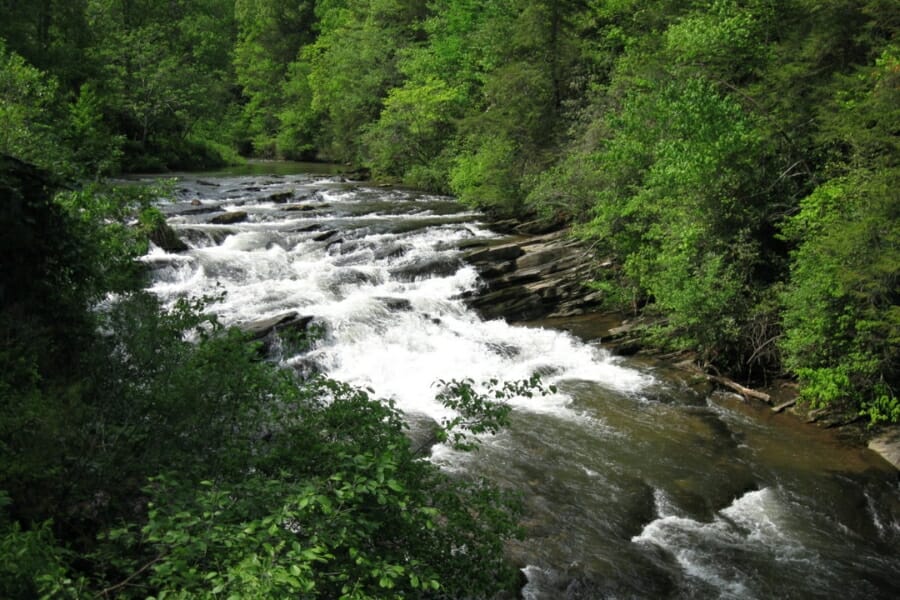
The Soque River flows for about 30 miles through beautiful scenery. It’s known for its clear waters, rocky outcrops, and gravel bars, which make it an excellent place for agates to form and settle.
There are many different kinds of rocks in the area, including sedimentary and metamorphic rocks, which could be the host rocks for agates. Agates are often found where the Soque River has worn down its banks, exposing gravel bars and sediments that contain agates.
Where we found agates in Thompson Creek
To maximize the chances of finding agates along the Soque River, exploring gravel bars, sandbars, and areas where the river’s flow has caused erosion is advisable.
Taylor Ridge
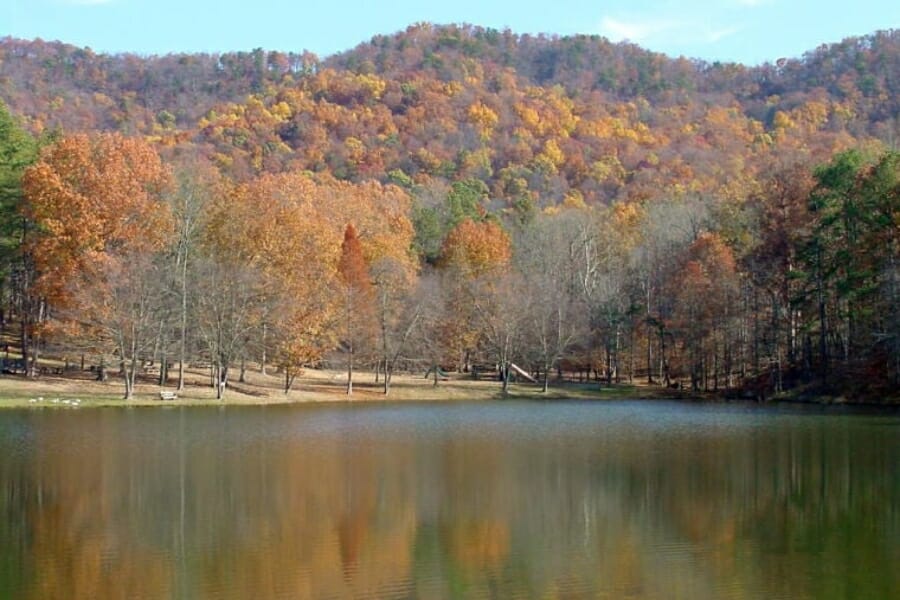
Taylor Ridge is an excellent place to go agate hunting because of its unique geology and the chance of finding agates there. Taylor Ridge is a geological formation in the northwest of the state that looks like a ridge and is made up of sedimentary rocks like limestone and chert.
Taylor Ridge has agates because it has chert, a silica-rich rock often found with agates. Chert nodules and layers in sedimentary rocks can be home to agates, which form over time as mineral-rich fluids fill the rock cavities with silica.
Where we found agates in the Taylor Ridge
If you want to find agates in Taylor Ridge, you should look in places where you can see chert formations. Along Taylor Ridge, you might be able to find agates in places like gravel beds, riverbanks, and roadcuts.
Other Great Places To Find Agates in Georgia
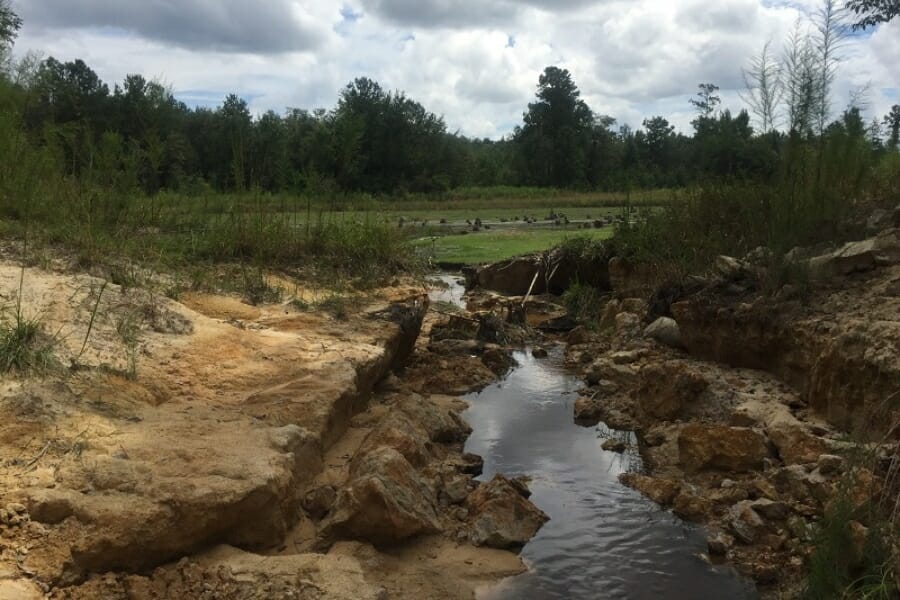
After revealing where to find the best agates in Georgia, we’ll give you some other ideas. We put them in order by county to help you out.
Our recommendations by county
| County | Location |
| Bibb | Holton Quarry |
| Burke | Brier Creek |
| Chattooga | Fish Hatchery |
| Cherokee | Cochrun Mica Mine |
| Cobb | National Cemetery |
| Crisp | Cordele area fields and cut banks |
| Gwinnett | Addison Lowe Farm |
| Jones | Round Oak area |
| Meriweather | Warm Springs out of town along railroad area |
| Murray | Spring Place area roadcuts |
| Muscogee | Upatoi Creek |
| Upson | Wilmoits Ravine |
| Washington | Hugh Taubutton farm |
| Wilkinson | Gordon area in gravels along nearby lake shore |
Additional areas you can find agates
We want to ensure your search works because Georgia is a big state. Here are some places where agates are often found.
Railroad cuts
Railroad cuts show a cross-section of the earth’s layers, offering many geology types. You can often find agates made by various natural processes within these layers.
As the cuts reveal different types of rocks, like sedimentary, volcanic, or metamorphic, collectors can find various agates with patterns, colors, and mineral inclusions.
By digging in railroad cuts, you can get to places where they can look for agates. Because of the exposed rocks and loose dirt, it’s easier to find agates that are buried in the layers or lying around on the ground.
Rivers and riverbanks
Rivers constantly change the landscape around them by eroding rocks and minerals along their paths. This constant movement slowly brings to the surface agates hidden under the surface before.
As the river moves, it moves the agates from where they were and carries them downstream. When the water hits obstacles like rocks or gravel bars, these agates end up on the riverbanks, which are accessible for you to find.
Riverbanks are the perfect places for agates to build up. Different layers of sedimentary, volcanic, or metamorphic rocks that are exposed along the river’s edge could contain agates.
Road cuts
Roadcuts are safe places for collectors to look for agates because they are controlled. It’s easier to find agates in the layers or scattered along the cut because the rocks and loose dirt are showing.
Roadcuts are also easy to get to because they are usually next to roads or highways. This makes it easy for agate collectors to explore and find agates there.
Also, roadcuts often go through different landscapes, including places with unique rock formations. This allows you to combine their love of agate hunting with the excitement of exploring as they travel to other areas and find many different agates.
Streams and creeks
Streams and creeks run into rocks, bends, and gravel bars, making natural places for water to pool. These places are great places for agates to settle down and build up.
Gravel bars, in particular, are places where agates gather because they are dense and don’t wear away quickly. Many different agates can be found along the banks and in these sedimentary deposits.
Streams and creeks are smaller than rivers and can be explored more easily with focus. You can move through these bodies of water and look for agates in nooks, crannies, and outcroppings of bedrock if you pay close attention to detail and pay close attention to what you see.
Common Agate-Hunting Questions
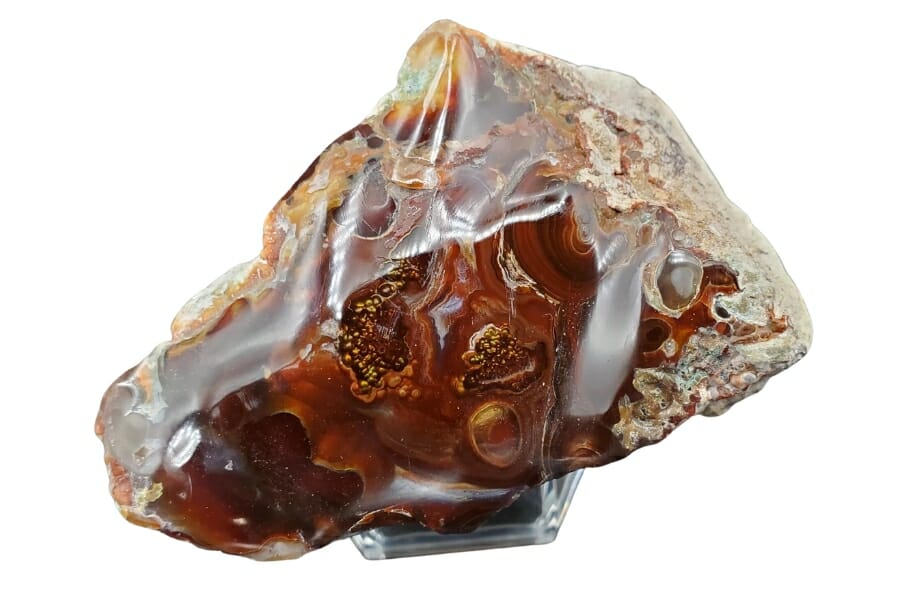
People who look for agates in Georgia often ask the following questions about these specimens, and it’s essential to know the answers.
Is it illegal to collect agate in Georgia?
If you do it correctly, Georgia is an excellent place to look for agates. When you’re in a public place, it’s best to follow the rules. Make sure you have permission to go on private land before you do.
The Best Places To Buy Agates In Georgia

Not everyone likes to spend the whole day outside looking for agates. Sometimes all you need is a new piece to display or another pretty agate specimen to add to your collection. Here’s a list of places in Georgia where you can buy agate crystals:
- Cottage House Crystals – 145 Forest Blvd Suite 405, Dawsonville, GA 30534
- Crystal Blue – 1168 Euclid Ave NE, Atlanta, GA 30307
- The Mineral Gallery – 155 Mill Rd #13, McDonough, GA 30253
- Outpost Gold and Gem Mining Co. – 7901 S Main St, Helen, GA 30545
- Stoneage Natural Rocks and Crystals – 3333 Buford Dr #1022, Buford, GA 30519
If you have any recommendations for our list please leave a comment below!

